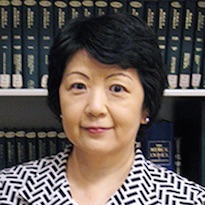GS6 Speakers
Chisato Miyaura

Vice President, Tokyo University of Agriculture and Technology (TUAT), Japan.
Japanese actions to improve Gender Diversity in STEMM Fields (download presentation here ![]() )
)
Plenary Panel 3: Developing Policies & Partnerships to Improve Gender Diversity in STEMM
Chisato Miyira is Vice President of Tokyo University of Agriculture and Technology, where she has been a professor since March 2003. She has also been a representative of the university’s Women's Future Development Organization since 2009, and was an Advisor to the President for Gender Equality Support Affairs on behalf of the university from July 2008 to March 2014. Prior to that, she was Director of the university’s Women's Career Support and Development Center, from September 2006 to March 2009.She was previously associate professor of Tokyo University of Pharmacy and Life Sciences, and before that was a research associate and lecturer at Showa University, Japan. She obtained her Bachelors of Pharmaceutical Sciences, Tokyo University of Science, in March 1978.
Summary of talk for Gender Summit 6 Asia-Pacific:
In Japan, the gender diversity for science is an important topic in the university, the research organization and the private company. In particular, the number of the woman researchers is limited in STEMM fields. From 2006, Japanese Government, the Ministry of Education, Culture, Sports, Science and Technology (MEXT), started the program“Human Resource Development Program for Science and Technology for Woman Researchers” to improve the environment and the career support for the woman researchers in universities. Tokyo University of Agriculture and Technology (TUAT), a national university located in Tokyo, received the grant from MEXT in 2006, and established The Women's Future Development Organization to start the various actions of the support system for the woman researchers and the female students. The child care is one of the life events for woman researchers, because the child care need time, and the research activity also need time every day. Then, TUAT employed young researchers to support the woman researchers with the child care, which is also good system for young researchers to have an opportunity of research work in the laboratory. The educational programs for the female students is the effective system to stimulate the various career path after the completion of Ph.D. graduate school. They can have several opportunities to communicate with the woman researchers in the private company and the public research organizations. These actions now spreads through the whole area in Japan, and both national university and private university try to continue the actions of the support for the woman researcher and female students especially in the STEMM fields. In this talk, I will introduce the activity in TUAT as an example, and discuss the situation of gender diversity for science in Japan.
